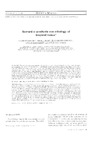Identificador persistente para citar o vincular este elemento:
https://accedacris.ulpgc.es/jspui/handle/10553/73046
| Título: | Toward A Synthetic Ecoethology Of Tropical Tunas | Autores/as: | Dagorn, L Petit, M Stretta, Jm Bernardet, X González Ramos, Antonio Juan |
Clasificación UNESCO: | 3105 Peces y fauna silvestre 2408 Etología |
Palabras clave: | Tuna Fish Genetic Algorithm Artificial Schooling Behavior |
Fecha de publicación: | 1995 | Publicación seriada: | Scientia Marina | Resumen: | The aim of this paper is to introduce the study of the eco-ethology of tropical tuna using a synthetic approach (Artificial Life and Artificial Intelligence). Two different models are proposed dealing with tuna schooling behaviour and distribution of tuna schools in the environment. The first model uses a genetic algorithm which is an optimisation technique born from the Darwinian concept of evolution. The aim is to find optimal behaviour (movement and schooling behaviour) for artificial tuna populations living in heterogeneous and dynamic environments. The result are discussed according to knowledge on real schooling behaviour. The second model is based on the ideal free distribution theory for tuna schooling behaviour to describe the possible distribution and migration of animals in a heterogeneous habitat. It is pointed out that simple behavioural sequences can manage an artificial tuna population : tuna schooling evolves depending on both the energetic rate and the biological and physical environment. These models represent examples of possible computational experiments which must be completed with real experiments at sea. | URI: | https://accedacris.ulpgc.es/handle/10553/73046 | ISSN: | 0214-8358 | Fuente: | Scientia Marina [ISSN 0214-8358], v. 59 (3-4), p. 335-346, (Septiembre-Diciembre 1995) |
| Colección: | Artículos |
Citas de WEB OF SCIENCETM
Citations
6
actualizado el 25-feb-2024
Visitas
42
actualizado el 10-ene-2026
Descargas
41
actualizado el 10-ene-2026
Google ScholarTM
Verifica
Comparte
Exporta metadatos
Los elementos en ULPGC accedaCRIS están protegidos por derechos de autor con todos los derechos reservados, a menos que se indique lo contrario.
